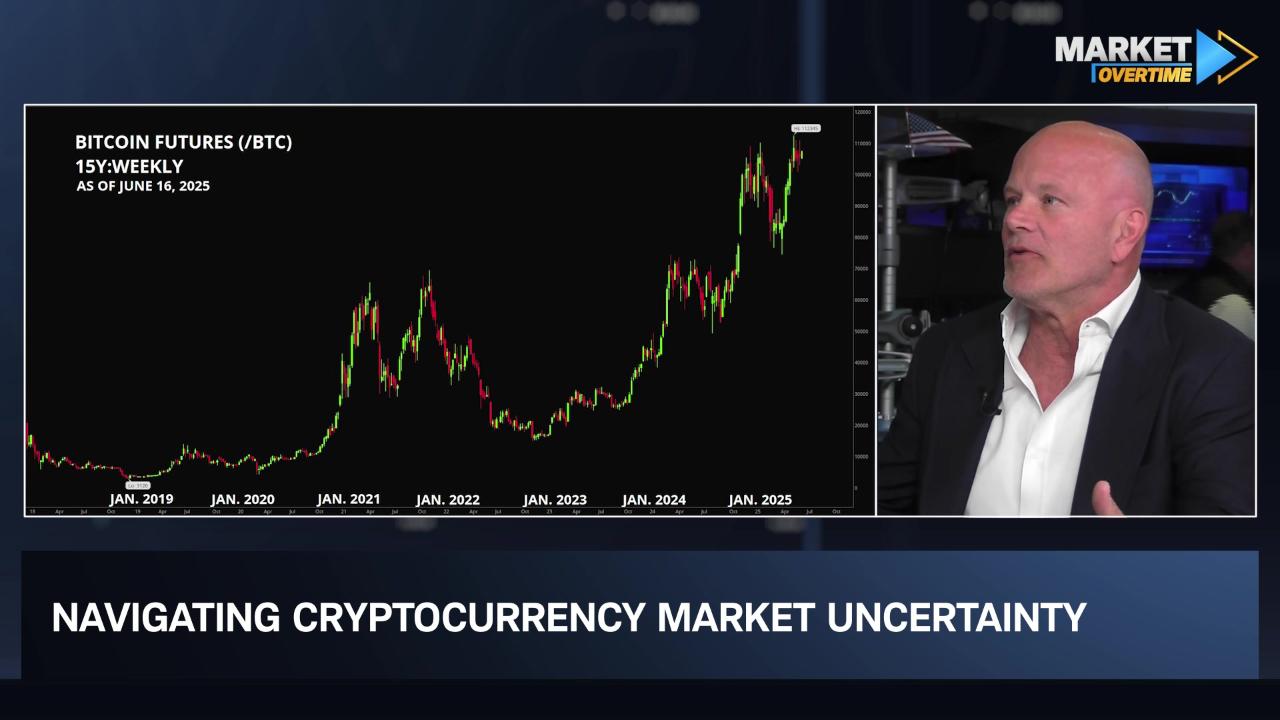- Market Minute
- Posts
- Galaxy (GLXY) CEO on How Bitcoin Can Hit $1M
Galaxy (GLXY) CEO on How Bitcoin Can Hit $1M

For the latest episode of Market Overtime, Nicole Petallides interviews Mike Novogratz, founder and CEO of Galaxy (GLXY).
His end game: “Bitcoin to $1 million.” By the end of the decade.
Novogratz said he started Galaxy for three reasons: to work with young people, learn something new, and have something to offer. So, he turned to crypto. His mantra was, “The herd is coming”: institutional demand would arrive eventually. Now, he says, it’s here – and he thinks change will be coming “very quickly.”
“We’re in a bear market in trust” that started in 2008, Novogratz argues. “That’s what gave crypto its reason to be.” He believes in Bitcoin as “digital gold,” and foresees widespread tokenization of assets, including equities.
Tokenization, according to McKinsey, is “the process of creating a digital representation of a real thing.” In this case, Novogratz seems to be implying that everything will be added to the blockchain as tokens, from equity shares to actual CEOs. This would create a fully digital representation of the real world, which could then be traded on some exchange or market. It’s a little bit like NFTs, but on a much bigger scale.
Besides a global lack of trust in institutions, Novogratz posits that a wave of populism across the world encourages governmental spending, depreciating currencies around the world. This, in turn, gives decentralized crypto more allure through the idea of “peer-to-peer” value transfers. “It’s about to move out of the sandbox into the real world.”
The first step is adoption, and the second is the macro backdrop. If these work in tandem, he thinks that younger generations, who like “digital stuff” will use their inherited wealth to buy Bitcoin over gold. “It’s valued because we think it is,” he says. Novogratz seems extremely confident in the technology of crypto, even as it buts up against major breakthroughs in AI and quantum computing.
“Most of crypto hasn’t happened yet,” he enthuses, “I think in the next five years you’re going to see it explode.” He imagines it being used for everything – decentralized ride sharing, for example.
The argument here seems to be that if trust in institutions is annulled, people have to trust each other as a community. It’s cutting out the middleman in the case of ride sharing, cutting out Lyft (LYFT) and Uber (UBER).
Crypto and the blockchain step in as a verifier – even though people have anonymized aliases on the blockchain, that unique identifier is tied to every transaction and contract they participate in. In turn, those identifiers can be traced across the chain by anyone, immutably. A person’s whole history – every transaction, every interaction, every success or failure – would be inscribed for anyone to see.
Returning to the ride sharing idea, right now, Lyft/Uber facilitate pickup, drop-offs and routes. They match drivers to riders, and riders have to trust that the company has done due diligence on those drivers. Drivers have less protection in that area because Lyft/Uber can’t background check passengers, but bad ratings – a gauge of social trust and behavior – can get someone banned.
Now, strip out that imperfect middleman and consider a system that facilitates this communal sharing, where you could theoretically see anyone’s history before making a deal with them. The volume of information on the blockchain, and analyzing it, makes this a specialized skillset right now. However, that is the ultimate goal of decentralization: a new type of social trust.
Novogratz is betting that the entire structure of how we do business will change – or at least, that crypto can build a parallel economy. In that case, Bitcoin to $1 million might be plausible.
Still, technological and educational hurdles remain. The crypto world is also wide and varied, with different aims across the field. Many different cryptocurrencies have their own blockchains, complicating matters further. Novogratz has to get the world onboard with his vision – but will people trust it?
Watch the full interview below:
Market Overtime
Featured Clips
Tune in live from 8 a.m. to 5 p.m. ET, or anytime, anywhere, on‑demand.
Or stream it via thinkorswim® and thinkorswim Mobile, available through our broker-dealer affiliate, Charles Schwab & Co., Inc
Please do not reply to this email. Replies are not delivered to Schwab Network. For inquiries or comments, please email [email protected].
See how your information is protected with our privacy statement.
Charles Schwab and all third parties mentioned are separate and unaffiliated, and are not responsible for one another's policies, services or opinions. Schwab Network is brought to you by Charles Schwab Media Productions Company (“CSMPC”). CSMPC is a wholly owned subsidiary of The Charles Schwab Corporation and is not a financial advisor, registered investment advisor, broker-dealer, or futures commission merchant.




